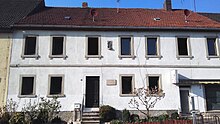Max Jobst
Max Jobst (born February 9, 1908 in Ebrach ; missing in Stalingrad since January 1943 ) was a German composer .
Life
From 1921 to 1926 Max Jobst was a student at the Amberg teacher training college , today's Max-Reger-Gymnasium . From 1926 Jobst was enrolled as a student at the church music school in Regensburg . From 1926 he attended the Academy of Music in Munich for further church music studies , where he also took the subjects of composition and piano. Jobst was a student of Ludwig Berberich and Gottfried Rüdinger ; he also attended the master class of Joseph Haas . In 1932 he got his first job as choir regent at the parish church in Tirschenreuth . Jobst later took over the post of choir regent in Regensburg- Reinhausen.
77 works by Max Jobst have been preserved. His first composition was written in 1921. The majority of his compositional work dates back to the years 1931 to 1940. A number of his sacred and secular compositions from this period were printed and made available to a wide range of interested parties through various publishers. In 1940 Max Jobst was called up for military service. He never returned from the war in Russia.
Musical classification
The main emphasis of the compositions by Max Jobst is on compositions for choir a cappella half each with sacred and secular texts, 28 of which have survived today. The piano works and piano-accompanied song cycles also set a clear accent. They testify to the composer's intensive engagement with this instrument. According to a war report from Stalingrad, he is said to have made music in the street on a grand piano recovered from a burning house. There are also compositions for organ .
One of his most prominent advocates was the Cologne music professor Heinrich Lemacher , to whom the "Christ vincit" mass for choir a cappella, which is regularly performed to this day, is dedicated.
The compositions of Jobst found so far are collected in the Bavarian State Library in Munich .
Works (selection)
- Adoramus te
- Arioso for violin and organ 1933.
- Ave Maria
- Benedictus dominoes
- Three Christmas carols
- Three Christmas carols
- One person: cheerful madrigals
- Three singers sang
- Chants for the praying mass
- Jesu dulcis memoria 1951
- Justus ut palma
- Maria lullaby
- Missa Christ vincit 1938. Werner Pees (Ed.), Bamberger Dommusik 2015.
- Missa Hemma
- Morning star of the dark night
- Music for string orchestra and piano (1939)
- Organ partita in the middle of life op.13
- Most beautiful child - the angels and the shepherds - morning star of the dark night
- Two pange lingua
literature
- Wolfgang Rappel: Jobst, Max. In: Karl Bosl (Hrsg.): Bosls Bavarian biography. Pustet, Regensburg 1983, ISBN 3-7917-0792-2 , p. 392 ( digitized version ).
- Ludger Stühlmeyer : Musica semper reformanda - music practice in the Archdiocese of Bamberg in the 19th and 20th centuries. In: Stations of church music in the Archdiocese of Bamberg. Published by the Office for Church Music Bamberg 2007.
- Helmut Bieler : Max Jobst. Schneider, Tutzing 2010, ISBN 978-3-7952-1298-8 .
Sound carrier
- Max Jobst - a composer portrait. Regensburg music edition.
Web links
- Max Jobst in the Bavarian Musicians' Lexicon Online (BMLO)
- Heike Nasritdinova: Jobst, Max . Entry in the database of the Oberpfälzer Kulturbund (currently not available)
- The estate is in the Bavarian State Library
Individual evidence
| personal data | |
|---|---|
| SURNAME | Jobst, Max |
| BRIEF DESCRIPTION | German composer |
| DATE OF BIRTH | February 9, 1908 |
| PLACE OF BIRTH | Ebrach |
| DATE OF DEATH | after January 1943 |
| Place of death | Stalingrad |

